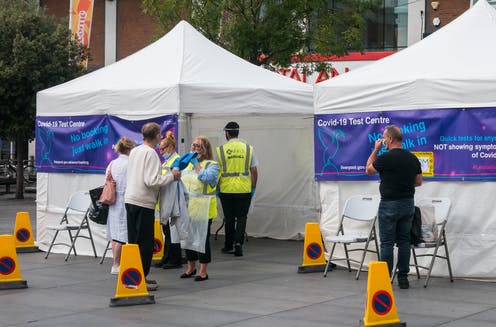
Alex Yeung/Shutterstock
Several European countries are drastically reducing the number of COVID tests performed. Sweden has already restricted free tests to healthcare staff, social care workers and clinically vulnerable people, and only if they are symptomatic. The UK government has announced that free tests for symptomatic and asymptomatic people in England will end on April 1, except for tests for social care workers and those most at risk.
The motivation to put an end to mass testing is partly financial. Current levels of testing come at a staggering cost of around £2 billion a month to the UK government. Though, another motivation is to send a message to the public. By scrapping mass testing, governments intend to signal that the pandemic is coming to an end and that normality is returning.
Billions of COVID tests have been performed globally. Half a billion results have been reported to date in the UK alone, with many more lateral flow tests remaining unreported. Such intensive diagnostic testing of asymptomatic people is unprecedented and has dramatically changed society’s attitude towards respiratory viruses. National dashboards displaying daily case numbers have become a defining feature of the pandemic, and many people have adopted COVID testing as a routine precautionary measure.
But the epidemiological impact of mass testing is somewhat mixed. Extensive testing is most useful to reduce transmission when coupled with the ability to trace contacts of those testing positive, which rapidly becomes impossible when the number of infected people is high, as it has been constantly in the UK since the summer of 2021. There is no clear-cut relationship between the number of tests performed by countries and the COVID cases, hospitalisations and deaths they experience.
The volume of coronavirus genome sequences produced during the pandemic is equally unprecedented. The number of coronavirus genomes deposited in Gisaid, the shared, global database of viral genetic sequences, has now reached 8.5 million, with over 2 million from the UK. This is more than for any other virus, including the flu, which has been routinely sequenced for decades.
The real-world value of the gigantic sequencing effort is also questionable. Genome sequencing has had essentially no effect on informing pandemic mitigation policies. It also contributed only marginally to the early detection of variants of concern. Alpha, delta and omicron emerged months before they were identified by sequencing. Sequencing has, though, allowed us to monitor the evolution of the virus in remarkable detail in near real-time.
But is now the time to scale back?
While the current volume of testing and sequencing is unsustainable in the long term, there are major questions over when these schemes should be scrapped and what elements of viral surveillance should be kept in place or introduced as replacements.
As stated, one major objective of the discontinuation of routine testing is to allow the population to regain a sense of normality and reduce anxiety. This would probably be psychologically effective for those who have reasonable trust in authorities and are not overly worried about being infected by the virus.

Kauka Jarvi/Shutterstock
But among those who are most worried, the premature scrapping of mass testing may increase fear. Unrestricted access to tests provides a sense of safety, responsibility and empowerment. Rapid testing is also essential for successful treatment. We now have potent COVID drugs, but these work best when taken early in an infection. We need to make sure we’re not losing a way of protecting people from severe disease or sowing panic.
Rolling back testing also risks fuelling conspiracies that the pandemic is being swept under the carpet by governments for economic reasons. Therefore, it may be best for mass testing to be scrapped when cases are low and when pandemic anxiety has largely receded. But it’s difficult to predict whether those conditions will be met by early April in England.
Surveillance in the future
Realistically, reducing testing and sequencing is a matter of when, not if. But that doesn’t mean COVID surveillance should stop. Elements need to be kept in place to allow for monitoring of case numbers, ideally with the capability to rapidly scale up if needed.
The UK Office for National Statistics’ Infection Survey provides reliable and unbiased COVID prevalence surveillance. The study has proven highly valuable and is considered gold standard in epidemiological surveillance. It would seem prudent to keep it in place at least until next winter, possibly in a slightly reduced form.

New Africa/Shutterstock
Surveillance could also take advantage of wastewater monitoring of the coronavirus. Sewage surveillance is a reliable, practical and non-invasive method for monitoring viral prevalence in the community. Sequencing of wastewater even allows for effective characterisation of viral variants.
It will be critical to maintain careful monitoring of the evolution of the virus to inform future vaccine updates. Early flagging of emerging variants would benefit from improved international surveillance. A scheme where a limited number of strains were sequenced each week from every country in the world could be sufficient for the early detection of emerging variants.
A truly global surveillance framework would in effect be preferable to the current situation, where the vast majority of viral sequences come from a handful of rich countries. Despite the massive sequencing effort, there is little genomic data available from large parts of Asia, Africa and South America. This leads to blind spots in the surveillance of emerging viral variants. Alternatively, global surveillance could rely on the systematic sequencing of viral strains carried by incoming international travellers, for example.
Pandemics of respiratory diseases end, not because the virus goes away, but because the associated disease and deaths fall below a threshold deemed acceptable, with the population losing interest. The scrapping of mass testing will represent a major step in this delicate transition. This may be the last stage of the pandemic. It would be ideal if we managed to navigate it better than some earlier steps and finished the pandemic on a high note.
![]()
Francois Balloux receives funding from the Wellcome Trust, the Biotechnology and Biological Sciences Research Council and the Medical Research Council.























